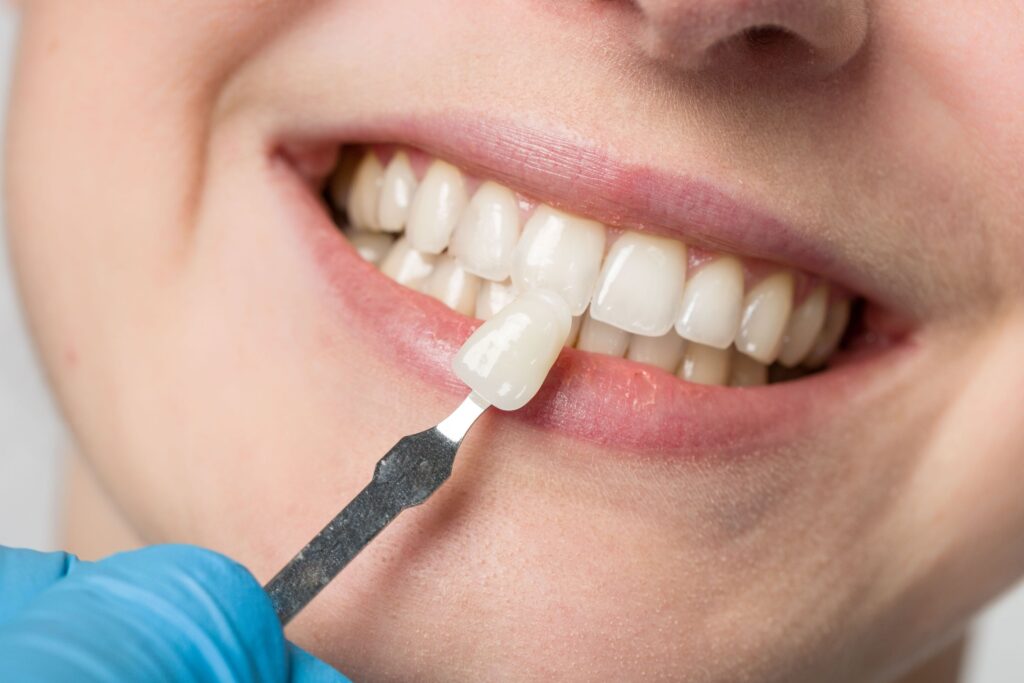
Do you have imperfections in your teeth that make you feel so self-conscious you’re scared to smile? Even minor concerns like chips, cracks, stubborn stains, and mild gaps or misalignments can significantly lower your self-esteem.
Thankfully, your dentist can provide resilient porcelain veneers to mask flaws and enhance your appearance. However, it’s important to be well-informed about potential side effects before proceeding with any elective treatment. Continue reading to learn 3 potential risks of getting veneers and how to address them!
Issue #1: Tooth Sensitivity
Veneers are thin shells made of durable ceramic that cover the front surfaces of your enamel to hide aesthetic imperfections. Although they’re only about 0.5 mm thick, your dentist must thin your teeth slightly so they fit correctly against your gumline. This protective outer layer doesn’t regenerate, and exposes more of the lower layers of dentin beneath.
It’s normal to develop some mild sensitivity, especially when eating anything overly hot or cold, until your restorations are placed and you adjust to their presence. Thankfully, you can usually safely count on over-the-counter medications like Tylenol or ibuprofen to reduce potential discomfort. It should resolve on its own after a few days, but if you experience prolonged or persistent pain, contact your dentist to ensure your prosthetics fit correctly.
Issue #2: Mismatched Shades
These tooth-colored covers are customized to match or improve your natural hue, but if you don’t take care of them correctly, you could end up with a mismatched smile. Your veneers are less porous than your enamel, meaning that they’re more resistant to stains. If you regularly consume dark foods and drinks like coffee, tea, berries, or wine, you could accidentally tint your teeth faster than your cosmetics. Unfortunately, your restorations can also start to look dark and dingy over time.
Brushing and flossing your teeth twice daily removes plaque and bacteria that pigmented particles cling to, minimizing the risk of stains. Furthermore, veneers don’t respond to topical whitening treatments, but a professional cleaning with your dentist can remove some surface stains if they become discolored.
Issue #3: Sore Gums
Your veneers are placed as close to your gums as possible without slipping beneath them to cover as much of the surface of your tooth as possible. Although this shouldn’t impact your periodontal health long-term, it might cause some irritation immediately following their placement.
Feeling somewhat sore or irritated for a few days is normal, but this usually fades relatively quickly. Typically, your dentist checks your mouth for any signs of gum disease before cementing your restorations over your enamel to prevent potential problems. However, if you experience inflamed tissues for more than a week, give them a call to verify that you haven’t developed an issue.
If you’re experiencing another symptom that wasn’t covered here, contacting your provider is the best way to protect and preserve your recently upgraded grin.
About the Practice
At Boston Prosthodontics Dental Group, patients benefit from a team of board-certified experts who offer a comprehensive array of services to meet all your needs under one roof. With prosthodontists and a periodontist on the team, they can help with everything from basic preventive care to cosmetics to more complex procedures. They take the time to tailor your treatment plan to your unique situation, then combine a compassionate approach with state-of-the-art technology to deliver comfortable, accurate results intended to last. If you’re considering getting veneers, you can request a consultation on the website or call (617) 523-5451.
